A Life in Books (and other wonderful things) with Joanna Rakoff
What books do you read over and over again?
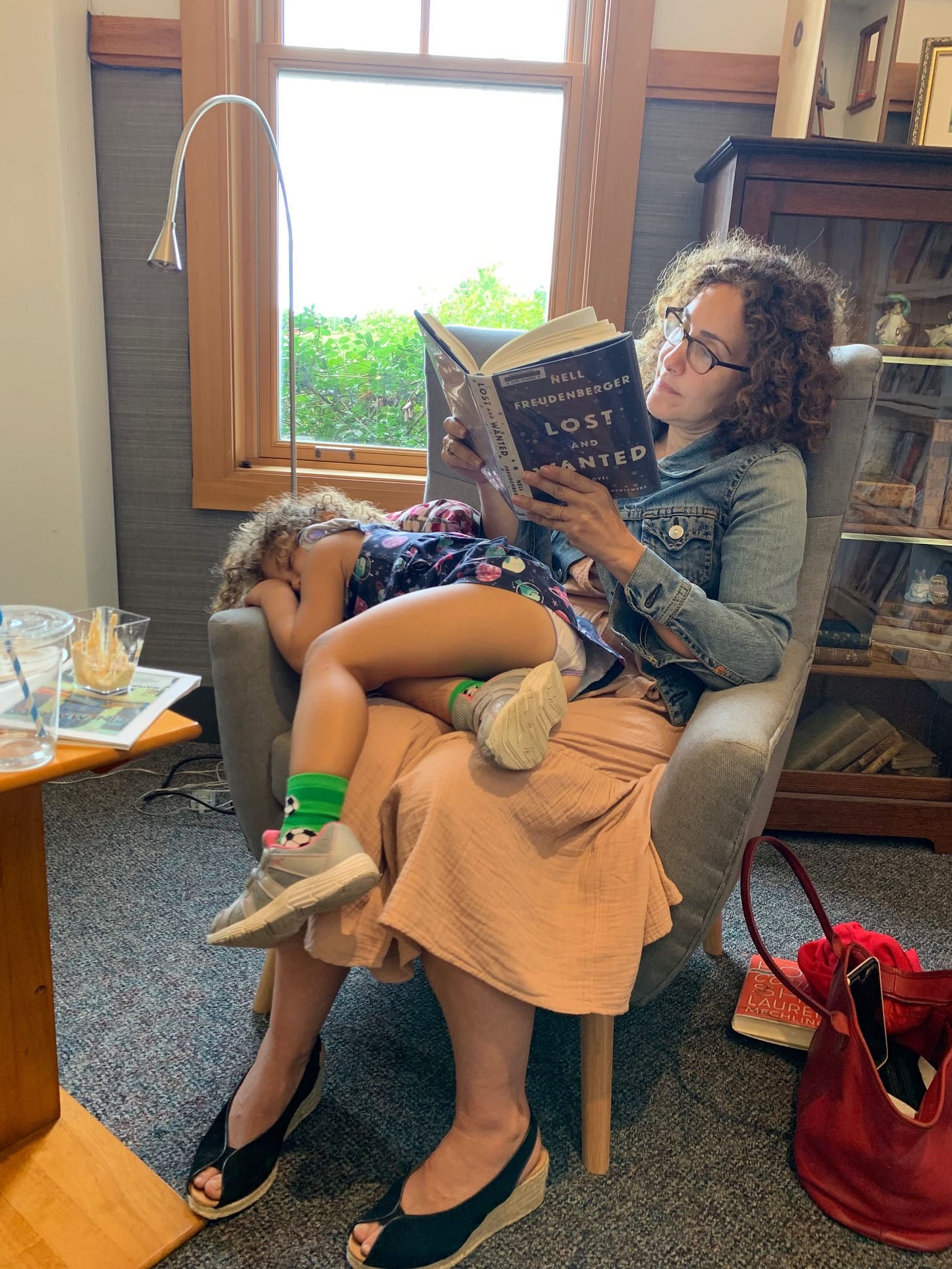
Hi beloved readers! It’s Joanna, back again, with my monthly musings on why and how and what and, this month, when we read. I’m writing to you from thirty-thousand feet in the air, on a plane headed west from Boston to San Francisco, for a long overdue week with my favorite cousins. After a quick stop at home, I head back to Logan, with my oldest, to get him settled in college, then meet everyone else—my husband, Keeril, and two younger kids—in Florida, for an overdue visit with Keeril’s family. As some of you know, my mom died last fall, and these trips to visit family feel very necessary to me right now—I can’t wait to hug my beloved cousin Roz, who’s more like an aunt to me, and Keeril’s dear, kind mom—but I’m also feeling a bit strange and sad, as it means foreswearing our usual summer routine. Or maybe I should call it a ritual? It held so much meaning for all of us that in fifth grade, my middle child, Pearl, wrote a whole essay about our family’s August vacation.
Let me explain.
For years and years, my family spent the last two weeks of August on the Cape, in a ramshackle, grimy rented beach house–you know the kind, filled with dented, scratched nonstick pans and dusty bric-a-brac–somewhere in the vicinity of a little-known, but loved-by-us inlet known as Hiawatha Beach. These vacations–if you can call replicating your exhausting domestic life in a different setting a “vacation”--held many traditions, including a visit to both the Wellfleet and the Truro libraries, where we’d sit for hours, reading in the shabby, dark Wellfleet branch’s children’s room, with its tiny chairs and dirty rug, or in the sunny, shiny alcoves of the Truro branch, which has a better selection of adult and YA novels, but a less robust set of kids’ titles. Yes, as you can see, I know these libraries as well as I know the rooms of my own house. I loved our time there as much as our days at our tiny bay beach, which is saying a lot, as I could spend all day bobbing in the ocean. We had other traditions, too, like a first night dinner at Mac’s on the pier, and a sweltering round of mini-golf at Arnold’s, and an afternoon in Provincetown, picking candy from bins at Cabot’s, but when I think about those long, lazy days on the Cape, my mind first turns to our library afternoons.
Perhaps because I also had my own tradition: Every August, I allowed myself–forced myself?--to read one big, buzzy book from previous years and also to re-read one of my all-time favorite novels. As we approach the start of August, each year, I begin thinking about which Big Book I’ll choose–this year I’m thinking about ALL THE LIGHT WE CANNOT SEE or WOLF HALL–and which favorite demands a millionth read. It’s telling, however, that the second question always proves harder than the first. There are so many books to which I want to return. So many writers whose style and tone, whose view of the world, wakes me up to myself, reminds me of what I want to do as a writer and as a person. So many narrators in whose hands I want to stay forever. And so many books, too, that I want to read a second or third time so that I might take them apart like a clock, coming to some understanding of how they function, structurally and narratively, rather than reading them for pure pleasure, as I did the first time. Some of the books I’m considering: Diane Johnson’s LE DIVORCE (which I’ve read perhaps a dozen times already), Ralph Ellison’s INVISIBLE MAN, Elizabeth Bowen’s THE DEATH OF THE HEART, and Laurie Corwin’s FAMILY HAPPINESS (which I’ve basically memorized).
It’s telling, too, that when I think back on past Augusts, I can recall only one or two of the Big Books I chose–Hanya Yanagihara’s A LITTLE LIFE, Amy Sohn’s PROSPECT PARK WEST–but every single one of those I re-read, some of them books that have effectively become a part of my personality, so purely do they speak to my own thoughts and experiences and so often have I read them, each time finding both the book I originally loved and an entirely new work, that original transformed by my own new perspective on the world, myself, literature itself. Do you have traditions like this? And do you have books you read over and over? I’d honestly love to hear about it in the comments. And if you’re interested in the books I read over and over, I recently wrote about a few them over at Lucy Pearson’s The Literary Edit. (I also discussed this list on TLE’s podcast, if your eyes need a break!)
Meanwhile, here are four new or newish books I just read and loved, which I know I’ll be revisiting in future Augusts. (Or perhaps this one!)
GHOST MOTHER, Kelly Dwyer
Okay, I opened this novel–Dwyer’s first in many years–knowing nothing about it, and essentially did not put it down until I reached the shattering final sentence. I really don’t want to give too much away, so let me just tell you the set up: After a lifetime in Chicago, Lilly Bly–a former actress, now struggling to get pregnant–reluctantly moves to a small Wisconsin town with her husband, Jack, and falls in love with a decaying mansion built by a P.T. Barnum-style circus impresario. Despite its impossible price and utter impracticality, Jack agrees to buy the place, as recompense for dragging Lilly to the middle of nowhere, on the condition that Lilly find a job, any job, and contribute to the house’s upkeep. But the house, it turns out, holds more history than their realtor reveals, and its fissures–both physical and metaphysical–widen the fissures in Jack and Lilly’s marriage. Or in Lilly’s sanity. It’s not clear, due to the utter brilliance of Dwyer’s first person narration. More than anything, GHOST MOTHER reminded me of du Maurier’s REBECCA, one of my favorite novels, but it also brought to mind Rufi Thorpe’s magnificent THE GIRLS FROM CORONA DEL MAR, another favorite, and, in its portrait of imperiled marriage, REVOLUTIONARY ROAD. This is a bold and brave novel. I loved Dwyer’s unabashed portrayal of Lilly, thorns and all, and also her frank dissection of the couple’s finances, their struggle to function as their credit card debt mounts. But I honestly loved everything about this novel and will be pressing it into friends’ hands for years to come.
A WELL-TRAINED WIFE: My Escape from Christian Patriarchy, Tia Levings
Holy moly, this memoir broke my heart into a million pieces, both for Levings–a clear-eyed intellectual inadvertently drawn further and further into the most extreme fringes of fundamentalism–and for our country, which swings, increasingly, in the direction of the terrifying communities Levings portrays in this book, her first, with extraordinary empathy, compassion, and understanding. The story: Raised by relatively devout–but kind and loving and sane– Christian parents, Levings’ life shifts, radically, when her family moves from Michigan to Florida and joins a Baptist megachurch, largely because Levings’ mother loves their choir. Though her parents don’t embrace the fundamentalist lifestyle–Tia and her siblings watch secular television, listen to indie music, wear jeans, attend public school, and have coed friendships–Tia slowly falls prey to the church’s intense indoctrination, reinforced by camp, youth groups, and simply conversations with friends. She ends up married at nineteen, to a man she barely knows, despite the many red flags–he’s viciously violent with her during their courtship–who slips further and further into the sort of radical fundamentalism that codifies physical abuse and considers women merely a vessel for children, required to address their husbands as “my lord.” The world in which she lands–with her four children–so terrified me, in its HANDMAID’S TALE-like misogyny, that at times, I had to put the book down and take deep breaths, as if I were reading the grimmest of Stephen King’s oeuvre. But I picked it right back up, compelled by Levings’ captivating narration and astonishing optimism. As with the best memoirs, this one is written from a place of love, as Levings’ struggles to understand what drew her–now former, thankfully–husband to high control religion, the ways in which it kept him sane, at the expense of her personhood, happiness, and dignity. This is a remarkable tale, told with wisdom and beauty, and–I wish this weren’t so–deeply relevant to the divide that threatens to wreck our nation.
THE RABBIT HUTCH, Tess Gunty
This extraordinary novel is, in a way, narrated by a ghost. It begins with Gunty’s spellbinding heroine, Blandine, “leaving her body,” murdered–or so it seems–for reasons and in ways that will become clear to the reader over the course of the 300 pages to follow. Set in a wrecked rustbelt town, Gunty’s debut swims around a circle of characters–an isolated new mother, the son of a legendary actress–but centers on Blandine, a product of the broken foster care system, whose ferocious intelligence and curiosity–she has renamed herself after the French martyr Blandina–provide a sanity-preserving scaffolding for the brutal and tragic confines of her life. Gunty writes with such urgency, precision, and power, I would follow her anywhere, but the specific places to which she brought me–and will bring you–forever changed the way I see the world. If you love big social novels–WHITE TEETH, THE CORRECTIONS, THE GOLDFINCH–you will love this novel.
Also: I bought THE RABBIT HUTCH as a gift for my middle child, Pearl, then fourteen, whose favorite novel was–and is–A VISIT FROM THE GOON SQUAD. Pearl read it immediately and intensely, then handed it directly to me and said, “mama, you have to read this now,” with tears in her eyes.
HERE AFTER, Amy Lin
This is unusual for me, but I’m struggling to find the words to describe this brief, haunting, singular memoir, which chronicles both the year after Lin’s husband Kurtis died suddenly, in perfect health, at thirty-two, as well as the couple’s courtship, marriage, and life together. In short, episodic chapters, Lin parses the nature and meaning of grief, fiercely questioning (and rejecting) western society’s approach to loss, in a manner that feels utterly fresh and unprecedented and necessary. I loved this book and feel, quite honestly, like it rewired my brain. Five pages from the end, I put it down as I felt bereft at leaving Lin’s searching, gorgeous voice.
I love this interview with Lin on genius critic Jordan Kisner’s podcast Thresholds, which has fantastic, complex interviews with artists and thinkers.
READING NOW:
Charles Bock’s chronicle of single fatherhood, following the loss of his wife, I WILL DO BETTER, which is making me cry, and Tyler Wetherall’s brilliant, disturbing coming-of-age tale AMPHIBIAN, which calls to mind both Mary Gaitskill and Jeanette Winterson.
SHORTER READS:
Katie Machen’s delightful essay on working at a cheese shop. (Warning: If you’re lactose-intolerant, this may induce serious longing!)
Kelly McMasters’ on returning to writing as a single mother (Also, if you haven’t read McMasters’ Paris Review column on running a bookshop, it is so wonderful!)
Glynnis MacNicol’s 2014 Elle essay on burnout is intimate and informative and perhaps even more relevant a decade later. (It helped me understand that I myself was suffering from the condition and to seek help.)
OTHER THINGS I LOVE:
Speaking of relevant! HBO’s limited series, THE GIRLS ON THE BUS, is a not entirely accurate portrait of female reporters on the presidential campaign trail–would a female Zoomer reporter really consider Hunter S. Thompson her primary influence?--but still fantastic and dangerously bingeable. If for nothing else, watch it for Carla Gugino’s controlled performance as a virtuosic political reporter.
I’m a little scared to bring up politics here but I vowed to make this column a true and honest account of what I’m reading, watching, listening to, and so on, and–like many of you, I’m sure–I basically spend about half my day in Kamala-land and alternately beaming and crying with excitement, relief, and even…joy. If you somehow haven’t seen her first campaign ad, with excerpts from her Milwaukee speech, now is the time.
A real question: Do you read books over and over again? And if so, which ones? (Sometimes, when I mention this habit to others, they look at me like I’m insane, so I’m truly curious.) And if not, do you have other reading traditions? I’d honestly love to hear about it in the comments!
Hoping you’re enjoying these final weeks of summer and sending love, Joanna
In case you missed my July recommendations, you can find them here:





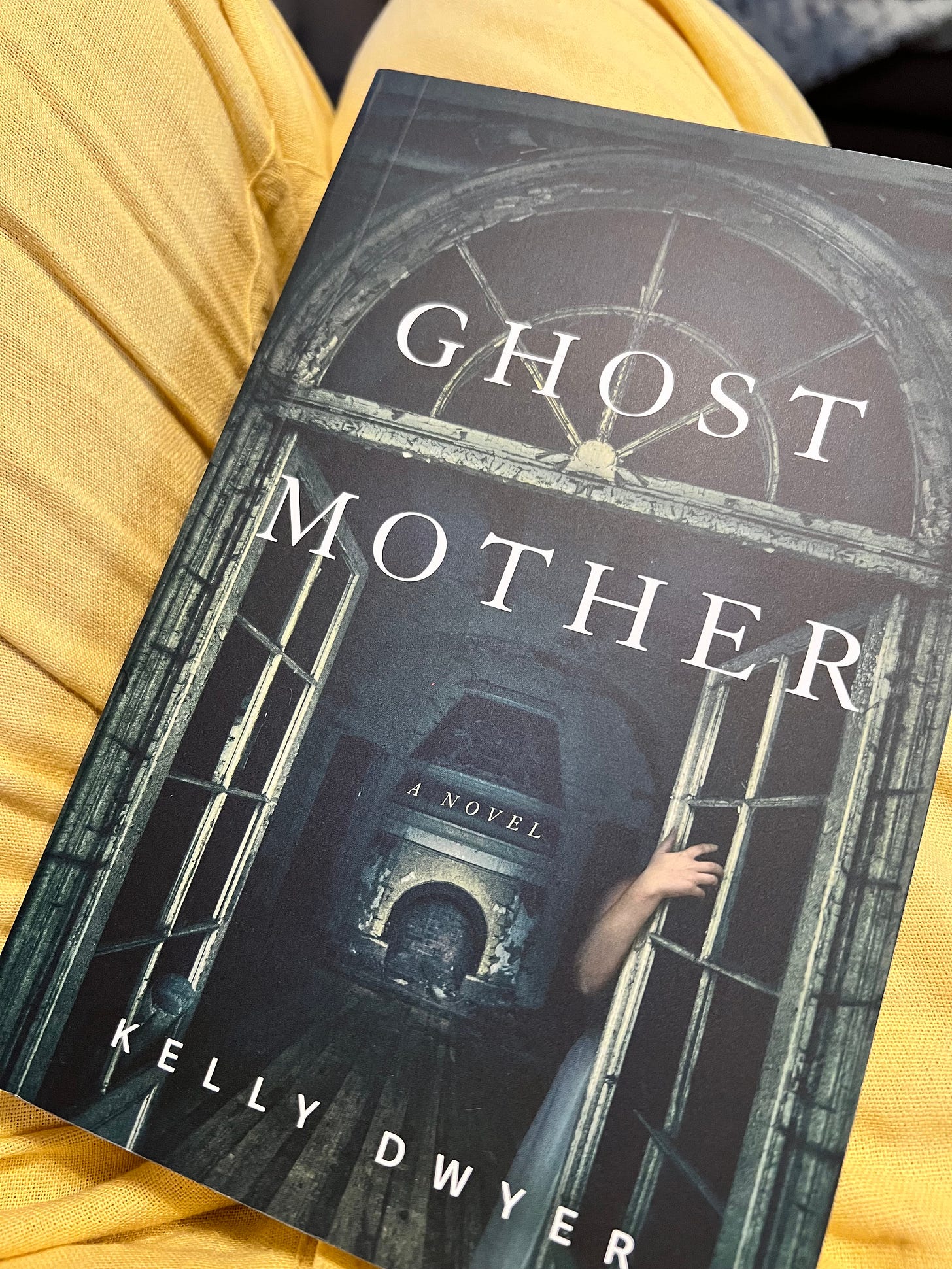
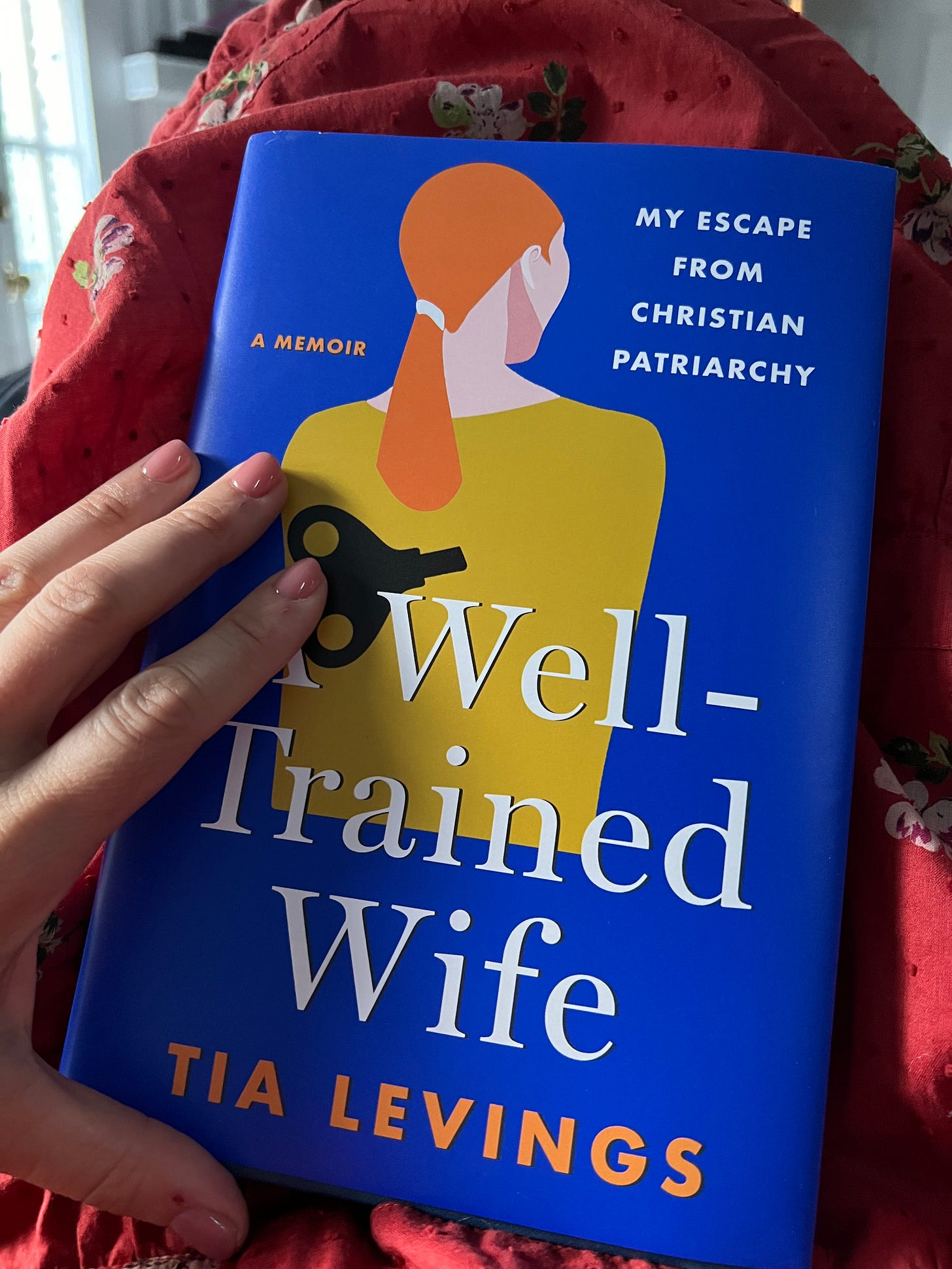
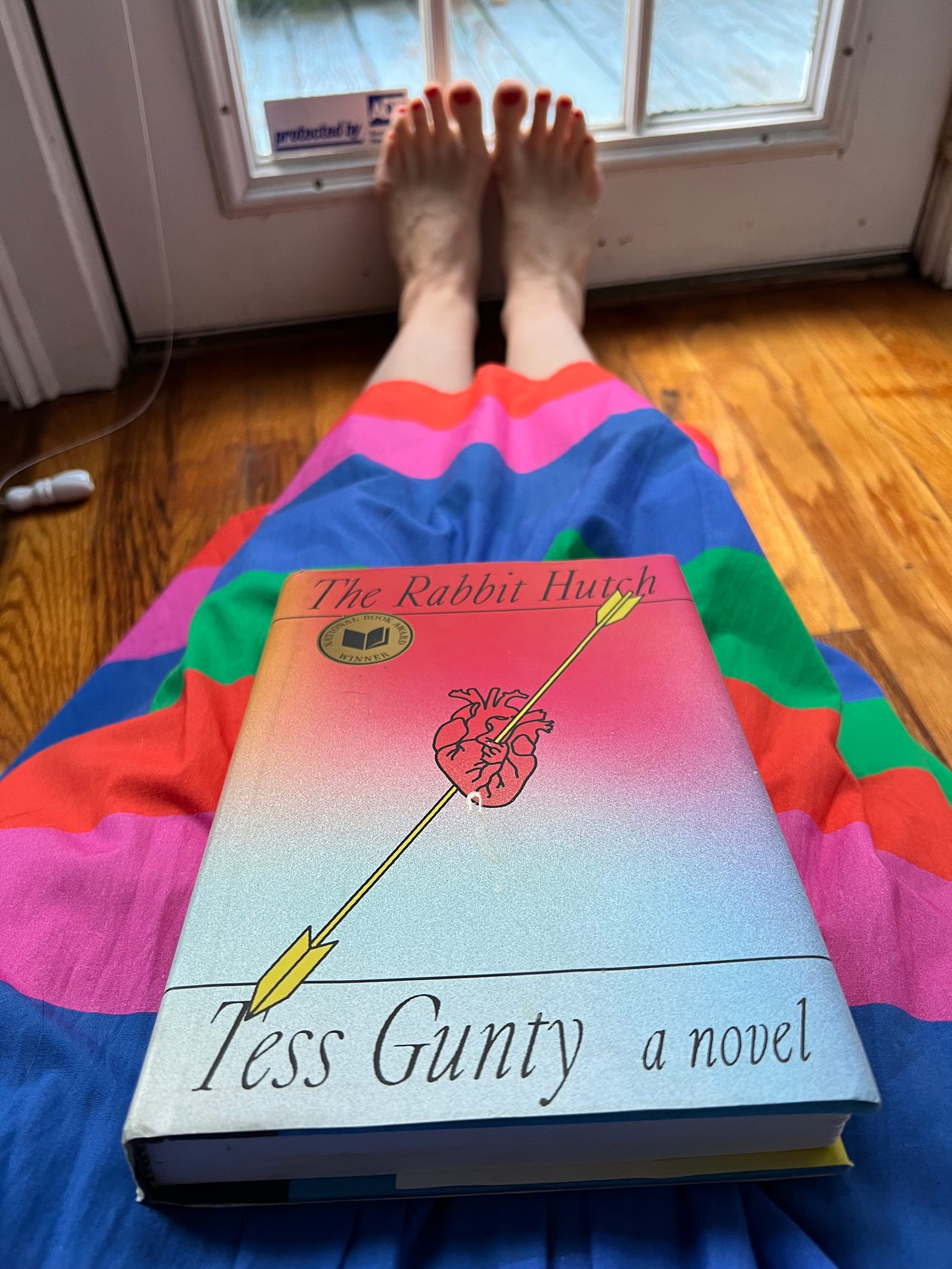

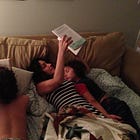
While I check out tons of books from the public library, my home collection consists of old friends I enjoy rereading. They are books that open me up in some way to what is true or real. Some of my favorites include The Storied Life of AJ Fickery, everything by Laurie Colwin (!), The Ha-Ha by Dave King, Rise and Shine by Anna Quindlen, and many of Elizabeth Berg’s books.
Persuasion by Jane Austen is my re read book. I love it - funny, sad, tender and every time I read it I find something new.